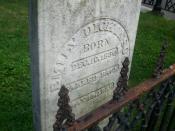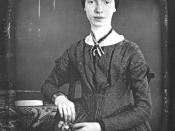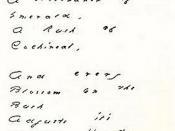Dickinson on Death and Religion
Emily Dickinson is one of the most renowned poets of her time, recognized for the amount of genuine, emotional insight into life, death, and love she was able to show through her poetry. She lived a life of solitude; her poems reveal an unusual awareness of herself and her world, a shy but determined mind. Throughout the history of literature, it has often been said that a poet's life and experiences greatly influence the style and the content of their writing. It is evident that Dickinson's life deeply inspired her to write the sort of poetry that she composed. Often writers, especially poets, have common themes or images throughout their writing. Emily Dickinson is no exception; "her subjects are few and consistently repeated- death, love, frustration, self-questioning, loneliness, and spirituality" (Jennings, 105). Dickinson's style of writing, use of diction, images and tone consistently support themes of death and religion throughout her poetry.
Writers all have their individual reasons for choosing the subjects they write about and many things influence what they select. Emily Dickinson grew up in a very religious home and her strong moral beliefs have influenced her writing; "The environment in which she lived and the church culture may have sparked imagination" (Eberwein, 1). She also isolated herself from the rest of the community. This atmosphere gave her the unique ability to write from her imagination. This is a very rare situation and makes her poetry like no other. According to critic Elizabeth Jennings, "Dickinson seems to be one of those poets who have extracted the largest possible amount of material from the most outward meager and restricted personal experience" (Jennings, 2). By limiting her experiences, she indirectly limited the subjects of her poetry. She "became a hermit by deliberate and conscience choice"...


